Home Tags Posts tagged with "Baghdad"
Baghdad
At least 29 people have been killed after gunmen have stormed two buildings in the Iraqi capital Baghdad, officials say.
Twenty of those killed were said to be women.
The attack took place late on Saturday, July 12, in the neighborhood of Zayouna in east Baghdad, police said. One officer said he “found bodies everywhere”.
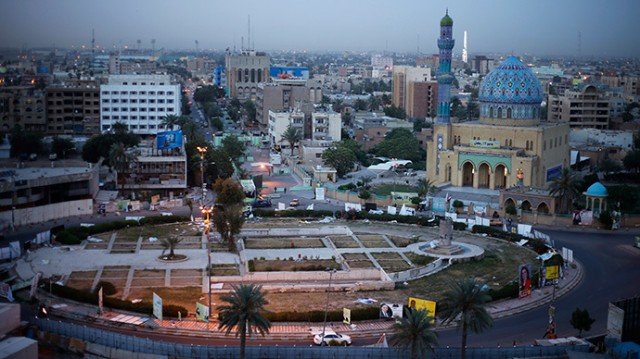
At least 29 people have been killed after gunmen have stormed two buildings in Baghdad’s neighborhood of Zayouna
The motive for the killings is not clear. No group has said it carried out the attack.
Reports said the two buildings were suspected to be brothels.
According to AFP, writing left on the door of one of the buildings read: “This is the fate of any prostitution.”
Locals in Zayouna have accused Shia militias of killing women thought to be prostitutes, Reuters news agency reported. The neighborhood is a mixed district of Sunni and Shia Muslims.
Prostitution is prohibited under Islam, the dominant religion in Iraq.
Iraq is experiencing an upsurge in instability as government forces battle an Islamist insurgency led by the jihadist Islamic State in Iraq and the Levant (ISIS), which has seized huge swathes of the country’s north-west and closed in on cities near Baghdad.
[youtube s56KDvntlR0 650]
US troops have been deployed to Iraq to assist the Iraqi army in combating a growing Sunni militant insurgency, the Pentagon has announced.
Nearly half the 300 special operations soldiers promised by President Barack Obama are in Baghdad or on the front lines of the fight.
The rest are expected within days.
Meanwhile, US Secretary of State John Kerry called for regional unity to expel the Sunni ISIS rebels who have taken large swathes of Iraq.
On Tuesday, two teams totaling 40 US troops began work assessing Iraqi troops on the front line, the Pentagon said.
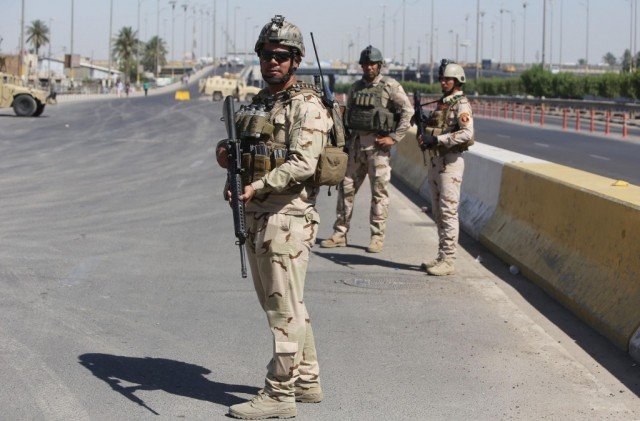
US troops have been deployed to Iraq to assist the Iraqi army in combating a growing Sunni militant insurgency (photo NBC News)
An additional 90 personnel will work in Baghdad to set up a new joint operations command centre.
Those teams will be joined by an additional four teams of 50 troops each in the next few days.
The Obama administration has stressed the troops are not intended as operational forces but instead are there to advise the Iraqis and provide intelligence.
The Iraqi government had requested American air strikes, but Barack Obama has been reluctant to do anything that could lead to accusations the US was taking sides in a sectarian conflict.
The insurgents, spearheaded by Islamists fighting under the banner of the Islamic State of Iraq and the Levant (ISIS), have overrun much of north and west Iraq, including the second-biggest city, Mosul.
The violence has claimed at least 1,075 lives in Iraq in June alone, most of them civilians, a UN human rights team has reported.
The UN said the figures, which include a number of verified summary executions, should be viewed as an absolute minimum.
US Secretary of State John Kerry has arrived in the northern Iraqi city of Erbil to hold talks with Kurdish leaders as Sunni rebels continue their offensive.
John Kerry’s trip comes a day after he visited Baghdad and pledged US support for Iraqi security forces.
He said Iraq faced a moment of great urgency as its very existence was under threat.
The Sunni rebels say they have fully captured the country’s main oil refinery at Baiji, north of Baghdad.
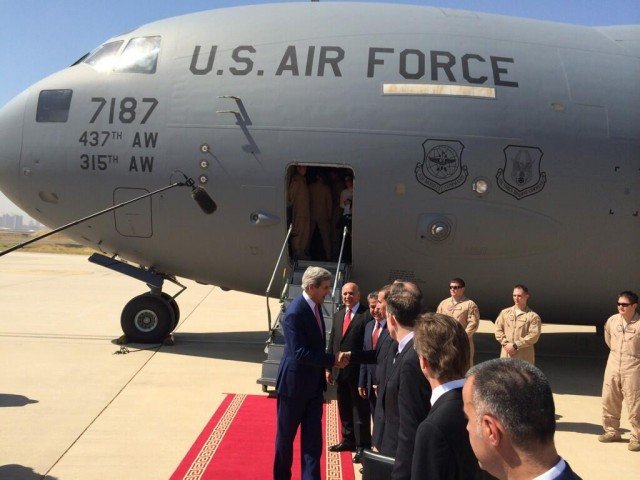
Secretary of State John Kerry has arrived in the northern Iraqi city of Erbil to hold talks with Kurdish leaders
John Kerry’s meetings with Kurdish leaders come as Iraqi Kurdish President Massoud Barzani strongly suggested that his region would seek formal independence from the rest of Iraq.
Speaking on Monday, John Kerry said Iraq’s PM Nouri al-Maliki and other leaders had committed themselves to the “essential ” step of forming an inclusive unity government by the end of the month.
Insurgents, spearheaded by Islamists fighting under the banner of the Islamic State of Iraq and the Levant (ISIS), have overrun a swathe of territory in the north and west including the second-biggest city, Mosul.
They are bearing down on a vital dam near Haditha and have captured all border crossings to Syria and Jordan.
The Baiji refinery, in Salahuddin province, had been under siege for 10 days, with militant attacks repulsed several times. The complex supplies a third of Iraq’s refined fuel and the battle has already led to petrol rationing.
A rebel spokesman said it would now be handed over to local tribes to administer, and that the advance towards Baghdad would continue.
Speaking at the US embassy in Baghdad, John Kerry said US support would “allow Iraqi security forces to confront [ISIS] more effectively and in a way that respects Iraq’s sovereignty”.
“The support will be intense, sustained, and if Iraq’s leaders take the steps needed to bring the country together it will be effective,” he said.
[youtube ZL0JSHPvuHQ 650]
Iraq forces are battling Sunni militants for control of the country’s biggest oil refinery.
A military spokesman said troops had repelled repeated attacks by the militants, led by the jihadist Islamic State in Iraq and the Levant (ISIS).
Forty assailants were killed overnight and on Wednesday, he added, denying the facility was close to being overrun.
But some workers said the militants had seized most of it and that troops were concentrated around the control room.
It comes as President Barak Obama considers a formal request from Iraq’s government for air strikes against the militants, who have seized several northern cities and towns since last week.
ISIS-led militants launched an assault on the Baiji refinery, about 130 miles north of the capital Baghdad, early on Wednesday.
Workers trapped inside said the attackers had breached the perimeter and destroyed one of its fuel tanks. Some said they had taken control of most of the facility. Video footage showed smoke billowing from the refinery and the black flag used by ISIS flying from a building.
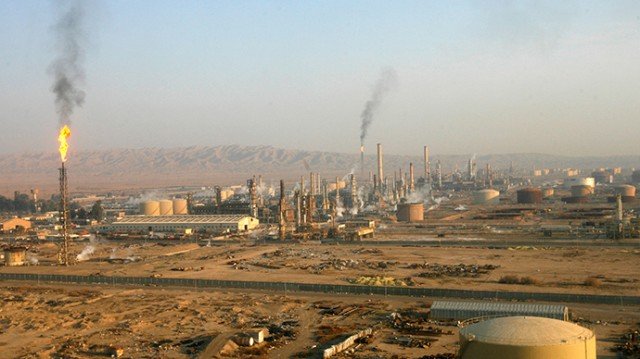
ISIS-led militants launched an assault on the Baiji refinery, about 130 miles north of the capital Baghdad
However, officials insisted that troops had resisted the advance.
Nearly all the 15,000 workers at the refinery and 100 foreign experts left on Tuesday when the plant was shut down in anticipation of the attack.
On Thursday morning, the remaining 250 to 300 workers were evacuated under an agreement brokered by local tribal leaders, one of the workers told the Reuters news agency.
The battle over Baiji, which supplies much of the country’s domestic fuel, has sparked fears that Iraqis will soon experience long lines at petrol pumps and electricity shortages.
On Wednesday there were fierce clashes in the Baquba, about 37 miles north of Baghdad, as jihadists again tried to enter the city centre and seize its prison.
Shia militiamen have been sent to assist in the defense of the capital of Diyala province, which has effectively become a frontline, and the nearby city of Samarra, site of a major Shia shrine.
PM Nouri al-Maliki has tried to assure Iraqis that the momentum is shifting.
The Iraqi government is awaiting President Barack Obama’s decision on air strikes.
On Wednesday, the chairman of the US Joint Chiefs of Staff, Gen. Martin Dempsey, warned that the US military still lacked sufficient intelligence to take action. He told a congressional hearing that pilots would have difficulty knowing who they were attacking from the air.
Asked if the intervention might come too late, Gen Dempsey said: “There is very little that could have been done to overcome the degree to which the government of Iraq has failed its people. That is what has caused this problem.”
ISIS has exploited deep resentment among Iraq’s minority Sunni Arabs, who have long accused Nouri al-Maliki of discriminating against them and monopolizing power.
[youtube 1svvy-HI0D8 650]
Iraqi Islamist militants have invaded the country’s biggest oil refinery, after pounding it with mortars and machine guns from two directions.
An official quoted by Reuters said the militants now controlled 75% of the Baiji refinery, 130 miles north of Baghdad.
Government forces have made new air strikes on militants advancing towards the capital.
Fighting is also reported in the western city of Ramadi.
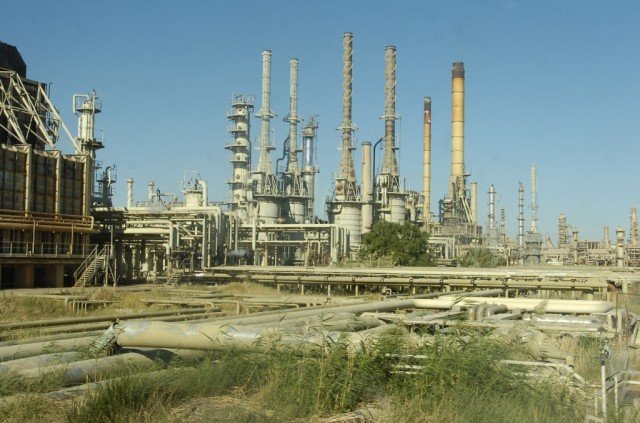
Iraqi Islamist militants now controlled 75 percent of the Baiji refinery, 130 miles north of Baghdad
The government is battling to push back ISIS (Islamic State in Iraq and the Levant) and its Sunni Muslim allies in Diyala and Salahuddin provinces, after the militants overran the second city, Mosul, last week.
PM Nouri al-Maliki appeared on television with Sunni Muslim and Kurdish leaders on Tuesday to issue a call for national unity in the face of the advance – they demanded that non-state forces lay down their arms.
However, such a call is unlikely to have much effect as Nouri al-Maliki has openly sponsored the formation of Shia Muslim militias to fight alongside regular Iraqi troops.
Hundreds of people have been killed since the start of the militant offensive last week, many of them believed to be captured soldiers publicly shot by ISIS-led firing squads.
During fighting in the city of Baquba this week, 44 prisoners were killed inside a police station in unclear circumstances.
The attack on the refinery started at 04:00 a.m. from outside two of the three main entrances to the refinery, according to Reuters.
Smoke rose from a spare parts warehouse and some stores of oil were reportedly destroyed.
“The militants have managed to break into the refinery,” the unnamed official told Reuters from inside the refinery.
“Now they are in control of the production units, administration building and four watch towers. This is 75% of the refinery.”
Foreign personnel were evacuated earlier but local staff reportedly remained in place, with the military defending the facility.
Baiji accounts for a little more than a quarter of the country’s entire refining capacity, all of which goes toward domestic consumption for things like petrol, cooking oil and fuel for power stations, an official told AP news agency.
Militants in the western province of Anbar, where the capital is Ramadi, said they had made advances, with a number of police stations near the town of Hit going over to dissident tribes.
Further north, the Iraqi government said it had recaptured the citadel in the strategic town of Tal Afar, where militants were said to have taken control on Monday.
Using unusually strong language, Nouri al-Maliki accused Saudi Arabia – which is largely Sunni – of backing ISIS. He also fired four army commanders for failing to halt the sweeping advance by the militants. They included the top commander for Nineveh, the first province where ISIS fighters made major gains.
Heavy clashes took place between Iraqi government forces and Sunni Islamist militants who have made major advances in the past week.
Reports say parts of the city of Baquba – just 37 miles from Baghdad – have been taken over by the rebels.
The US is deploying up to 275 military personnel to protect staff at its huge embassy in the capital.
Reports from Baquba – capital of Diyala province on the northern approaches to Baghdad – say rebels are reported to have taken over several quarters and captured the main police station, seizing many weapons.
At Tal Afar, a strategic city west of Mosul in the province of Nineveh, there are reports that reinforcements have arrived to boost government forces trying to recapture the town from rebels. The Iraqi air force is said to have been carrying out strikes in the area.

Heavy clashes took place between Iraqi government forces and Sunni Islamist militants who have made major advances in the past week (photo AP)
The city of 200,000 people, which has a mixed Sunni and Shia population, lies between Mosul and the Syrian border and was taken just before dawn on Monday.
In Anbar province to the west of Baghdad, Sunni militants shot down a government helicopter near the city of Falluja, and say they destroyed several tanks in fighting there. They also say army forces fled from a military base near Ramadi, the provincial capital.
Qasem Suleimani, the commander of an elite unit of Iran’s revolutionary guards, is reported to be in Baghdad, helping military leaders and Shia militias co-ordinate their campaign against the rebels.
In Vienna, US officials held brief discussions about Iraq with their Iranian counterparts at a meeting about Tehran’s nuclear program, but American officials have been quick to dismiss reports of military collaboration with a major foe.
In a letter to Congress, President Barack Obama said the 275 military personnel being sent to Iraq would protect US citizens and the embassy in Baghdad, and would remain there until the security situation improved.
A White House statement said that their main role would be to help embassy staff to relocate to US consulates in the cities of Basra in the south and Irbil in the north, and provide airfield management and security.
President Barack Obama has already ruled out sending in ground troops to fight alongside Iraqi government forces, but drone strikes remain a possibility.
The aircraft carrier USS George HW Bush has been deployed to the Gulf, accompanied by two more warships.
The UN says that ISIS fighters have carried out hundreds of summary executions since their offensive began last week.
UN human rights chief Navi Pillay said that systematic killings in the north of the country “almost certainly amounted to war crimes”.
[youtube 47GsbrNejSo 650]
Iraq is voting in the first parliamentary elections since the withdrawal of US troops three years ago.
Polling began at 07:00 local time and closes at 18:00.
PM Nouri al-Maliki is hoping to win a third term in office amid a growing insurgency in the west of the country.
Iraq is experiencing its worst unrest since 2008, with 160 people killed in the past week alone.
Some 22 million Iraqis are registered to vote, with almost 50,000 polling stations open across the country.
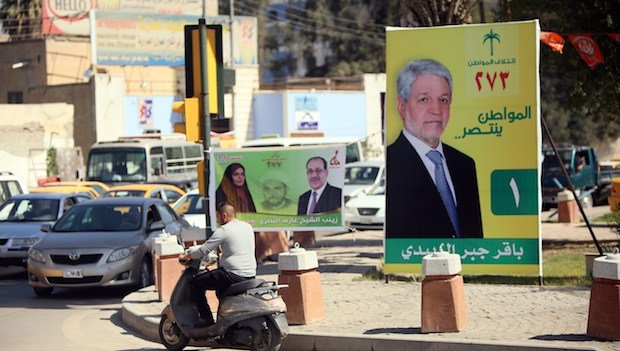
Iraq is voting in the first parliamentary elections since the withdrawal of US troops three years ago (photo Ali al-Saadi/AFP/Getty Images)
There is a heavy security presence in the capital, with military helicopters on patrol.
The government has temporarily closed the airport and the main roads in and out of the city in an attempt to reassure voters.
Some voters face multiple searches before being allowed into polling stations.
While it is difficult to predict the outcome of the poll, Nouri al-Maliki is still expected to be a pivotal figure in the coalition-building process which will follow the election.
After casting his vote in Baghdad’s heavily-fortified Green Zone, Nouri al-Maliki said: “Our victory is certain, but we are waiting to see the size of our victory.”
His State of Law alliance, a Shia coalition, has largely avoided the fragmentation seen by other political blocs since the last election.
The campaign has so far been a violent one, with 50 people killed on Monday when soldiers, police and overseas citizens cast their votes.
One bomb struck a Kurdish political rally in the town Khanaqin, killing 30 people and wounding at least 50 others.
On Friday, at least 31 people were killed as a series of blasts targeted a Shia election rally in Baghdad. The Islamic State in Iraq and the Levant – an al-Qaeda offshoot – said it had carried out the attacks.
More than 9,000 candidates are competing for 328 parliamentary seats. There will be no voting in parts of Sunni-dominated Anbar province, where security forces still battle Islamist and tribal militants for control of the provincial capital Ramadi and nearby Falluja.
[youtube DEBrKTLDp_g 650]
At least 19 people have been killed in two car bomb explosions in the Iraqi capital, Baghdad, officials say.
The blasts happened within minutes of each other in the central Shia district of Karrada in the middle of the afternoon rush hour.
The first bomb exploded outside a restaurant and a bakery in al-Andalus Square, and the second outside a court opposite a major police headquarters.
More than 240 people have been killed this month in militant attacks in Iraq.

At least 19 people have been killed in two car bomb explosions in the Iraqi capital, Baghdad
Sunni insurgents linked to al-Qaeda appear to have been behind most of the violence, including a wave of bombings and shootings in Baghdad and towns to the north on 23 July which left at least 107 dead.
Clouds of black smoke rose above the centre of the capital on Tuesday after the latest bombings, which also injured more than 50 people.
“We were in a patrol when we heard the first explosion. The second explosion hit another square, and we went to help,” Ahmed Hassan, a policeman, told the Reuters news agency.
“There was a minibus with six dead passengers inside it.”
At least five policemen were also among those killed, officials said.
An interior ministry official told the AFP news agency that the first attack had been carried out by a suicide bomber, while the local TV news channel al-Sharqiya said they had both been suicide bombings.
[youtube 8E_E3rAKsqQ]
Waves of bomb attacks and shootings in north of Baghdad have killed at least 82 people, say security and medical officials.
Many of those killed were security forces – who appear to have been a prime target.
One of the worst-hit places was Taji, a Sunni neighbourhood some 20 km (12 miles) north of Baghdad, where at least 18 people were killed.
At least 112 people were wounded on one of the bloodiest days of the year.
Deadly car bombings hit Baghdad, and a government building in Sadr city was attacked. At least seven car bombs hit the northern oil city of Kirkuk.

Waves of bomb attacks and shootings in north of Baghdad have killed at least 82 people
Dhuluiya, Saadiya, Khan Beni-Saad, Tuz Khurmatu and Dibis were also said to have suffered attacks.
The security forces suffered badly in Monday’s attacks, with at least 15 Iraqi soldiers killed in a single attack on a base in Salaheddin province.
Police checkpoints were hit by car bombs, army bases were struck by mortar fire, and one policeman was even attacked in his home.
Those in Taji died in a string of explosions.
“What is the guilt of these poor people?” asked resident Ali Hussein.
“They are working to earn a living. It is a poor market and people were here to shop in this market when the blast happened. Why did this happen?”
It is the deadliest day in Iraq since 13 June, when another wave of bombings killed 84 people and injured nearly 300.
On Sunday bombings south of the capital killed at least 17.
Violence dipped in Iraq following the insurgency in 2006 and 2007, but sectarian violence has returned across the country in recent months amid worsening political tensions.
At least 237 people were killed during June, making it one of the bloodiest months since US troops withdrew in December.
Deadliest attacks in 2012:
• 3 July: At least 40 killed and many more wounded in series of attacks across Iraq
• 13 June: Wave of bombings kills 84 and injures nearly 300 in deadliest day since US troops withdrew last December
• 4 June: More than 20 people killed in bomb attack in Baghdad
• 20 March: At least 45 people die in series of co-ordinated attacks including car bombs in Kerbala city that kill at least 13
• 23 February: At least 55 people killed and hundreds injured in wave of bombings and shootings across the country
• 27 January: A suicide car bomb kills at least 32 and injures about 60 in predominantly Shia Muslim district of Baghdad
Serial bomb attacks in six Iraqi provinces, including 10 locations in Baghdad, has killed 62 people and wounded dozens more, Iraqi police say.
Many of the dead in the Iraqi capital were Shia pilgrims gathering for a religious festival.
In Hilla, two car bombs exploded near a restaurant, killing at least 15 people.
There has been a wave of attacks on the Shia community in recent days, as it marks the anniversary of the death of Shia imam Moussa al-Kadhim.
Four people were killed in a mortar attack near a religious shrine in Baghdad on Sunday.

Serial bomb attacks in six Iraqi provinces, including 10 locations in Baghdad, has killed 62 people and wounded dozens more
Iraq’s interior ministry said following that attack that there would be heightened security across the city as they anticipated further violence.
Pictures from Hilla on Wednesday showed the mangled remains of a restaurant, damaged cars and roads strewn with debris.
Police and fire crews were clearing the scene.
Violence in Iraq has fallen since the sectarian killings of a few years ago, but militants still frequently attack security forces and civilians.
Shia targets have come under renewed attack since the government of Shia Prime Minister Nouri Maliki moved against senior members of the predominantly Sunni Iraqiya political bloc.
The American flag has been lowered in Baghdad, bringing nearly nine years of US military operations in Iraq to a formal end.
Leon Panetta, the US Defence Secretary, told troops the mission had been worth the cost in blood and dollars.
Leon Panetta said the years of war in Iraq had yielded to an era of opportunity in which the US was a committed partner.
Only about 4,000 US soldiers now remain in Iraq, but they are due to leave in the next two weeks.
At the peak of the operation, US forces there numbered 170,000.

The American flag has been lowered in Baghdad, bringing nearly nine years of US military operations in Iraq to a formal end (photo Getty Images)
The symbolic ceremony in Baghdad officially “cased” (retired) the US forces flag, according to army tradition.
It will now be taken back to the USA.
Leon Panetta told US soldiers they could leave Iraq with great pride.
“After a lot of blood spilled by Iraqis and Americans, the mission of an Iraq that could govern and secure itself has become real,” he said.
Iraqi Deputy Prime Minister Hussain al-Shahristani said Iraqis were glad the US troops were leaving.
“They have been difficult years,” he told the BBC.
“We have had some successes together. We had some failures. We have some mishaps.
“I think we are all happy that the American soldiers are returning home safely to their families and we are also confident that the Iraqi people and their armed forces, police, are in a position now to take care of their own security.”
Some 4,500 US soldiers and more than 100,000 Iraqis have died in the war.
The conflict, launched by the Bush administration in March 2003, soon became hugely unpopular as claims that Saddam Hussein was hiding weapons of mass destruction and supporting al-Qaeda militants turned out to be untrue.
Iraq war has cost the US some $1trillion.
Republicans have criticized the pullout citing concerns over Iraq’s stability, but a recent poll by the Pew Research Centre found that 75% of Americans backed the troop withdrawal.
President Barack Obama, who came to office pledging to bring troops home, said on Wednesday that the US left behind a “sovereign, stable and self-reliant Iraq”.
In a speech in North Carolina to troops who have just returned, Barack Obama hailed the “extraordinary achievement” of the military and said they were leaving with “heads held high”.
“Everything that American troops have done in Iraq, all the fighting and dying, bleeding and building, training and partnering, has led us to this moment of success,” President Obama said.
“The war in Iraq will soon belong to history, and your service belongs to the ages.”
Barack Obama said the war had been “a source of great controversy” but that they had helped to build “a sovereign, stable and self-reliant Iraq, with a representative government that was elected by its people”.
He announced in October that all US troops would leave Iraq by the end of 2011, a date previously agreed by former President George W. Bush in 2008.
Some 1.5 million Americans have served in Iraq since the US invasion in 2003. In addition to those who died, nearly 30,000 have been wounded.
Troop numbers peaked during the height of the so-called surge strategy in 2007, but the last combat troops left Iraq in August last year.
A small contingent of some 200 soldiers will remain in Iraq as advisers, while some 15,000 US personnel are now based at the US embassy in Baghdad – by far the world’s largest.
Some Iraqis have said they fear the consequences of being left to manage their own security.
Baghdad trader Malik Abed said he was grateful to the Americans for ridding Iraq of Saddam Hussein, but added: “I think now we are going to be in trouble. Maybe the terrorists will start attacking us again.”
But in the city of Falluja, a former insurgent stronghold which was the scene of major US offensives in 2004, people burned US flags on Wednesday in celebration at the withdrawal.
“No-one trusted their promises, but they said when they came to Iraq they would bring security, stability and would build our country,” Ahmed Aied, a grocer, told Reuters news agency.
“Now they are walking out, leaving behind killings, ruin and mess.”
Concerns have also been voiced in Washington that Iraq lacks robust political structures or an ability to defend its borders.
There are also fears that Iraq could be plunged back into sectarian bloodletting, or be unduly influenced by Iran.
[youtube kFdyZFNqpI4]











